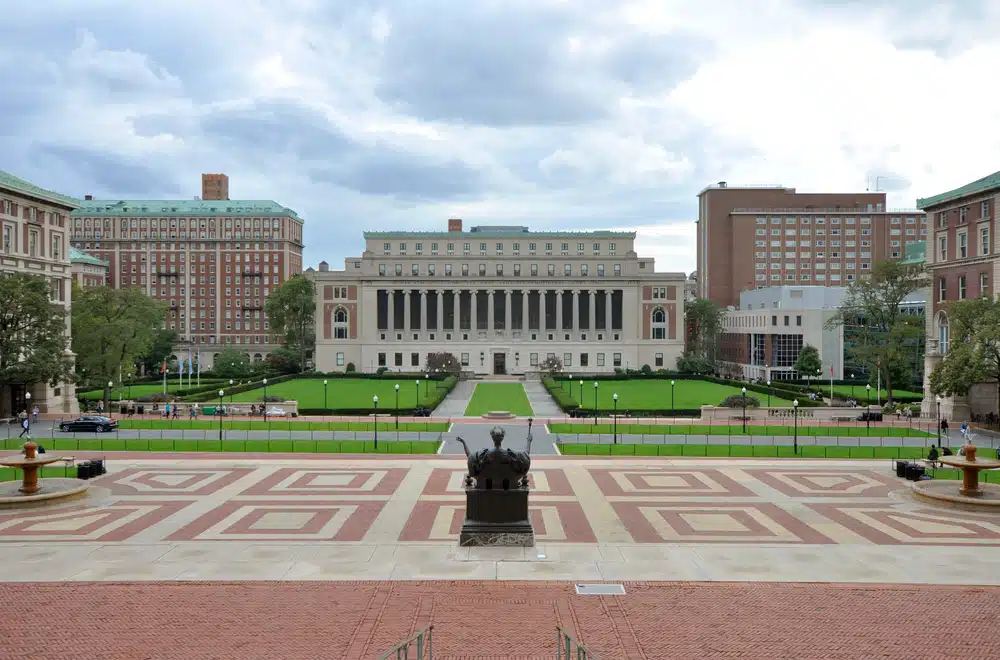Unlocking the Secrets of Columbia Math: A Guide to Success
Math is an exciting and dynamic field of study that can unlock boundless opportunities for those who pursue it. And when it comes to studying math, there are few places in the world more prestigious than Columbia University. As a student studying Columbia math, you are part of a thriving academic community with access to world-class professors, cutting-edge research opportunities, and an array of resources that can help you unlock your untapped potential and achieve new heights of success.
In this article, we’ll take a comprehensive look at what it takes to study math at Columbia and provide you with an insider’s guide to navigating this rigorous and exciting academic field.
The History of Columbia Math: Understanding its Roots
Columbia’s Department of Mathematics has a rich and storied history that dates back over a century. Established in 1890, the department has been a pioneer in many areas of math research, from number theory to topology to functional analysis and beyond.
Many of the most celebrated minds in math have passed through Columbia’s halls, including John Nash, the subject of the book “A Beautiful Mind.” Today, Columbia’s Department of Mathematics continues to push the boundaries of the field with innovative research, world-class teaching, and a commitment to the highest standards of academic excellence.
One of the most significant contributions of Columbia’s Department of Mathematics is its role in the development of the field of applied mathematics. In the early 20th century, Columbia mathematicians began applying mathematical principles to real-world problems, such as engineering and physics. This approach, which became known as applied mathematics, revolutionized the field and led to many important discoveries and advancements.
Today, Columbia’s Department of Mathematics remains at the forefront of applied mathematics research, working on a wide range of practical problems, from climate modeling to financial analysis.
The Benefits of Pursuing a Degree in Math at Columbia University
So, why should you choose to study math at Columbia? Well, for starters, the university is consistently ranked as one of the top math programs in the world, meaning that you’ll be learning from some of the brightest minds in the field. Additionally, Columbia’s location in New York City puts you in the midst of a thriving academic and cultural scene, with plenty of opportunities for internships, research, and networking.
And perhaps most importantly, Columbia’s math program is designed to help you achieve your full potential, with a rigorous curriculum that challenges you to think creatively, communicate effectively, and develop critical thinking skills that will serve you well in any career you choose to pursue.
Another benefit of pursuing a degree in math at Columbia University is the diverse range of courses offered. From algebraic geometry to mathematical physics, the program covers a wide range of topics, allowing you to explore different areas of interest and develop a well-rounded understanding of the field. Additionally, the faculty at Columbia are not only experts in their respective areas of research but they are also dedicated to mentoring and supporting their students, providing guidance and resources to help you succeed.
Finally, Columbia’s math program also offers numerous opportunities for collaboration and community building. Whether it’s through student organizations, research groups, or study sessions, you’ll have the chance to connect with other math enthusiasts and build lasting relationships with your peers. This sense of community can be invaluable, both in terms of academic support and personal growth, and can help you develop the skills and confidence you need to succeed in your future career.
The Best Professors to Study Math With at Columbia University
One of the biggest advantages of studying math at Columbia is the opportunity to learn from some of the most accomplished and respected mathematicians in the world, including professors such as Peter Woit, who has made significant contributions to quantum field theory, and Shou-Wu Zhang, an expert in number theory and algebraic geometry.
But with so many great professors to choose from, how do you know which ones are right for you? The answer, of course, depends on your interests, goals, and learning style. However, some professors who are consistently praised by students include John Wright, who teaches courses on optimization and convex analysis, and Mark Green, an expert in algebraic geometry who has authored numerous influential papers and textbooks.
Another notable professor to consider studying math with at Columbia is Andrew J. Blumberg, who specializes in algebraic topology and its applications to geometry and physics. Blumberg has received numerous awards and honors for his research, including the prestigious Sloan Research Fellowship and the National Science Foundation’s CAREER Award. He is also known for his engaging teaching style and his ability to make complex mathematical concepts accessible to students of all levels.
Navigating the Curriculum: A Guide to Required Math Courses at Columbia
Columbia’s math curriculum is designed to provide students with a well-rounded and rigorous education in the field, with courses covering everything from calculus and linear algebra to probability theory, topology, and differential geometry. Some of the required courses for math majors include Linear Algebra, Modern Algebra, Analysis I and II, and Probability Theory.
In addition to core courses, math majors can also choose electives in areas such as complex analysis, mathematical physics, algebraic geometry, and more. However, navigating the curriculum and deciding which courses to take can be a daunting task, so be sure to consult with your academic advisor to ensure that you stay on track and make the most of your time at Columbia.
It is important to note that while the math curriculum at Columbia is challenging, it is also highly rewarding. Many math majors go on to pursue graduate studies in the field or to work in industries such as finance, data analysis, and computer science. In fact, Columbia math majors are highly sought after by employers due to their strong analytical and problem-solving skills.
For students who are interested in pursuing a math major but are unsure if it is the right fit, there are many resources available to help you explore the field. The math department hosts regular events such as seminars, workshops, and guest lectures, which provide opportunities to learn more about different areas of math and to connect with faculty and other students in the department. Additionally, there are many student organizations on campus, such as the Columbia Math Society, which offers a supportive community for math enthusiasts of all levels.
How to Ace Your Math Classes at Columbia: Tips and Strategies
Math classes can be challenging, even for the most talented and motivated students. But with the right mindset and study strategies, you can succeed in even the most difficult courses. Some tips for acing your math classes at Columbia include attending lectures and taking careful notes, participating in class discussions, forming study groups, and consistently practicing problem sets and exercises.
Additionally, make use of the many resources available to math students at Columbia, such as the Math Help Room, which offers drop-in tutoring, and the math library, which houses an extensive collection of books and journals in the field.
Another important strategy for succeeding in math classes at Columbia is to seek help when you need it. Don’t be afraid to ask your professor or TA for clarification on a concept or problem. You can also make use of online resources, such as Khan Academy or Wolfram Alpha, to supplement your learning.
Finally, don’t forget to take care of yourself. Make sure to get enough sleep, exercise regularly, and eat a healthy diet. A clear mind and a healthy body will help you stay focused and motivated throughout the semester.
The Importance of Networking as a Math Major at Columbia University
Networking is a crucial aspect of success in any field, and math is no exception. As a math major at Columbia, you have access to a wide range of resources and opportunities for building your professional networks, including guest lectures, seminars, conferences, and more.
Additionally, many math majors go on to pursue careers in fields such as finance, technology, and academia, so it’s important to start building your network early. Some ways to do this include joining student organizations, participating in research projects, and attending career fairs.
Another great way to build your network as a math major at Columbia is to connect with alumni who have pursued careers in your field of interest. The Columbia Alumni Association offers a variety of networking events and resources, including mentorship programs and online directories. You can also reach out to alumni directly through LinkedIn or other professional networking platforms. By building relationships with alumni, you can gain valuable insights into your chosen career path and potentially even secure job opportunities.
Research Opportunities in Math at Columbia: How to Get Involved
Research is a critical element of any math student’s education, providing hands-on experience in applying theoretical concepts to real-world problems. At Columbia, math students have access to a wide range of research opportunities, from individual projects to group collaborations and more.
Some of the research projects currently underway in Columbia’s math department include work on linear algebraic groups, algebraic topology, and Riemannian geometry. To get involved in research as a math major at Columbia, be sure to talk to your academic advisor, attend departmental seminars, and take advantage of the many research opportunities available through the university.
One of the benefits of participating in research as a math major at Columbia is the opportunity to work with renowned faculty members who are experts in their fields. These faculty members are often leading research projects and can provide valuable guidance and mentorship to students. Additionally, participating in research can help students build important skills such as critical thinking, problem-solving, and communication, which are highly valued by employers in a variety of industries.
Research opportunities in math at Columbia are not limited to the math department. Students can also explore research opportunities in related fields such as computer science, physics, and engineering. Collaborating with students and faculty from other departments can provide a unique perspective and lead to interdisciplinary research projects that address complex problems from multiple angles.
Preparing for Careers in Math After Graduating from Columbia University
As a math major at Columbia, you’ll be well prepared for a range of careers in fields such as finance, data analysis, computer science, and academia. Some of the top employers of Columbia math graduates include companies such as Goldman Sachs, Google, and Microsoft, as well as academic institutions such as MIT, Harvard, and Princeton. To prepare for these and other careers in math, be sure to take advantage of internships, co-op programs, and other opportunities for gaining hands-on experience. Additionally, consider pursuing advanced degrees or certifications in math-related fields to further enhance your skills and credentials.
One of the key skills that math majors develop at Columbia is problem-solving. This skill is highly valued in many industries, including engineering, consulting, and healthcare. As a math major, you’ll learn how to approach complex problems, break them down into smaller parts, and develop solutions using logic and critical thinking. These skills are transferable to many different fields and can make you a valuable asset to any organization.
Another benefit of studying math at Columbia is the opportunity to work with world-renowned faculty members. Columbia’s math department is home to many distinguished professors who are leaders in their fields. By working closely with these experts, you’ll gain a deeper understanding of mathematical concepts and develop a strong foundation for your future career. You’ll also have the opportunity to participate in cutting-edge research projects and contribute to the advancement of mathematical knowledge.
Scholarships and Financial Aid for Math Majors at Columbia University
Math majors at Columbia may be eligible for a wide range of scholarships and financial aid to help offset the costs of tuition, room and board, textbooks, and other expenses. Some of the scholarships available to math majors include the Columbia College Scholarship, the Jacques Hadamard Fellowship, and the Louis Sudler Prize in the Arts. Additionally, Columbia participates in federal aid programs such as the Pell Grant and the Federal Direct Loan Program, as well as private loans and grant programs. To learn more about the financial aid resources available as a math major at Columbia, be sure to consult with the university’s financial aid office.
One of the unique financial aid opportunities available to math majors at Columbia is the Math Achievement Award. This award is given to students who have demonstrated exceptional academic achievement in math and is renewable for up to four years. Recipients of this award also have the opportunity to participate in research projects and attend conferences and seminars related to their field of study.
Another resource available to math majors at Columbia is the Math Help Room. This is a free tutoring service provided by the university’s math department, where students can receive one-on-one assistance with coursework and homework assignments. The Math Help Room is staffed by graduate students and faculty members who are experts in various areas of mathematics and is a valuable resource for students who need extra support in their studies.
Student Organizations for Math Majors at Columbia: Which Ones to Join
Student organizations can be a great way to connect with peers who share your interests and get involved in extracurricular activities related to your field.
At Columbia, math majors can choose from a range of student organizations, including the Columbia Math Club, which hosts guest lecturers, competitions, and other events related to math; the Association for Women in Mathematics, which aims to promote gender equity in the field; and the Columbia Data Science Society, which focuses on the intersection of math, statistics, and computer science. Check out each group and find the one that aligns with your interests and goals.
Another student organization that may be of interest to math majors at Columbia is the Society for Industrial and Applied Mathematics (SIAM). This group focuses on the practical applications of math in industry and research and provides opportunities for members to network with professionals in these fields.
SIAM also hosts workshops and conferences to help members develop their skills and knowledge in applied math. Consider joining SIAM if you are interested in exploring the real-world applications of math beyond academia.
The Role of Technology in Modern Mathematics Education at Columbia
Technology is transforming the way we learn and teach math, and Columbia is at the forefront of this revolution. The university offers a range of cutting-edge tools and technologies for math students, including online resources, interactive simulations, and software programs that can help you visualize complex concepts and solve problems more efficiently.
Additionally, Columbia’s math department is home to a number of innovative research initiatives involving big data, machine learning, and other areas of technology that are transforming many aspects of modern life. By keeping up to date with the latest technologies and tools in math, you can stay ahead of the curve and prepare yourself for success in a rapidly evolving field.
One of the most exciting developments in technology and math education at Columbia is the use of virtual and augmented reality. These immersive technologies allow students to explore mathematical concepts in a whole new way, by visualizing complex equations and structures in three dimensions.
For example, students can use virtual reality to explore the geometry of a hypercube or to visualize the behavior of a complex function in real-time. By incorporating these cutting-edge technologies into the classroom, Columbia is helping to prepare the next generation of mathematicians for a world where technology is an essential tool for success.
A Look into Cutting-Edge Research Projects in Mathematics Conducted by Columbia Faculty and Students
Columbia’s math department is home to some of the most exciting and groundbreaking research projects in the field, with faculty and students engaged in cutting-edge work on a range of topics, from the geometry of differential equations to algebraic topology and beyond.
One recent project involved using machine learning algorithms to predict the outcome of clinical trials, while another focused on the geometry of high-dimensional spaces. By getting involved in research projects as a math major at Columbia, you can gain hands-on experience in these and other exciting fields, and help contribute to the ongoing advancement of mathematical knowledge.
One particularly interesting research project currently being conducted by Columbia faculty and students involves the study of prime numbers and their distribution. This project aims to develop new algorithms and techniques for identifying patterns in the distribution of prime numbers, which could have important implications for cryptography and other fields. By participating in this project, students have the opportunity to work with some of the leading experts in the field and contribute to cutting-edge research that could have a real-world impact.
Demystifying Common Misconceptions about Studying Mathematics at Columbia
Despite its many benefits, there are still some misconceptions about studying math, particularly at a rigorous and prestigious institution like Columbia. Some common misconceptions include the belief that math is only for “geniuses” or that it is a dry and boring subject with little relevance to the real world.
In reality, studying math at Columbia can be an exciting and rewarding experience, allowing you to explore some of the most fundamental concepts and principles that underlie the workings of the universe. Additionally, math is a highly versatile field with applications in virtually every industry, making it an excellent choice for students who want to pursue a wide range of careers.
Overall, studying math at Columbia is an excellent choice for any student with a passion for the subject and a desire to achieve great things. By taking advantage of the resources, opportunities, and academic rigor that Columbia offers, you can unlock your full potential as a mathematician, researcher, and critical thinker, and build a foundation for success that will serve you well for years to come.
Furthermore, studying math at Columbia provides students with access to a diverse and supportive community of fellow mathematicians and scholars. The department offers a variety of clubs, organizations, and events that allow students to connect with others who share their interests and passions. These opportunities not only provide a sense of belonging and camaraderie but also offer valuable networking and career-building opportunities that can help students succeed in their future endeavors.
Want to learn more about getting into Columbia University? You’ve come to the right place. At AdmissionSight, we have over 10 years of experience guiding students through the competitive admissions process.
AdmissionSight can help you put your best foot forward when applying to college this fall. Contact us today for more information on our services.









































